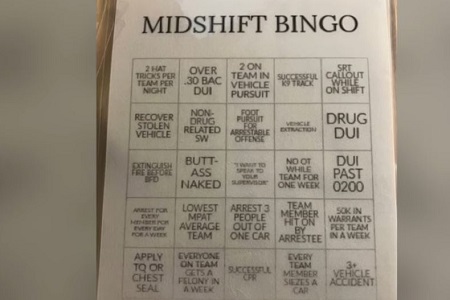Police officers were caught playing a game of “Crime Bingo,” in which a bingo card is filled out based on the player making certain numbers and types of arrests, Bozeman, Montana Police Chief Jim Veltkamp reported Friday.
Thirteen officers, including two sergeants, played the Crime Bingo game for 12 days before they were caught and their antics were stopped in mid-January.
“Two teams of patrol officers were engaged in a bingo competition, where success in the game hinged on whether they engaged on actions listed on the bingo card,” Police Chief Veltkamp explained at a press conference discussing the scandal:
“It did look like your standard bingo card. Then they filled in squares on the card of things that they wanted to see happen, or have happen, in order to check off that box on the bingo card.”
The game could incentivize officers to take unjustified actions and make undeserved arrests, Chief Veltkamp said:
“An example of one of those was to do a search warrant on a car, which in itself, is one of their duties. The concern is if they manipulated anything in order to be able to search a car.”
A copy of one of the bingo cards was provided to the press. Some of the more eccentric square objectives on the card include:
- “Butt-ass naked.”
- “Team member hit on by arrestee”
- “Lowest MPAT (Montana Physical Ability Test) average team.”
“These cards have been in law enforcement for a long time,” Kozak told Cowboy State Daily. “Thirty years ago I saw cards like this. Dispatch centers have cards like this. A lot of different career fields.”
The Bozeman Police Department incident prompted two investigations into the game and how it may have affected law enforcement. A review of 24 cases handled during that time concluded that no rights of those involved had been violated.
Nonetheless, as the Gallatin County Attorney’s office noted Friday in a statement, prosecutors are constitutionally required to disclose to defendants any evidence that the arresting officers may have potentially may been biased:
“Under Brady v. Maryland and Giglio v. United States decisions, prosecutors are required to disclose to the defense, in a timely manner, any evidence that is favorable to the accused and material to guilt or punishment.”
….
“This is not a discretionary process—it is a constitutional mandate designed to ensure fairness in our justice system.”

